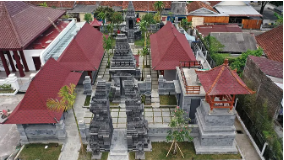Universitas Gadjah Mada (UGM) exemplifies its dedication to diversity, equity, inclusion, and human rights through a comprehensive approach guided by appointed university officers. These officers are tasked by the university to advise and implement policies, programmes, and training initiatives to promote diversity, equity, inclusion and human rights. UGM’s commitment is evident in its efforts to foster a safe and supportive environment, from providing multifaith spiritual facilities to implementing robust measures against sexual violence, ensuring that inclusivity and safety remain cornerstones of its academic community.
Fostering Inclusivity Through Multi Faith Spiritual Facilities
UGM now proudly accommodates houses of worship for six religions on its campus, ensuring that all members of its academic community can practise their faith in a supportive environment. In addition to the Campus Mosque and Mardliyah Islamic Center, which were built earlier on, UGM has inaugurated a Spiritual Facilities Complex. This complex features two church buildings—one for Catholic religious activities and the other for Christian worship—a vihara for Buddhist practices, a temple for Confucian worship, and a pura for Hindu ceremonies. These facilities not only enable the UGM diverse community to fulfil their spiritual needs but also embody the university’s commitment to fostering mutual respect and understanding across different faiths. This initiative is a collaboration between Universitas Gadjah Mada (UGM) and The Alumni Family of Universitas Gadjah Mada (Keluarga Alumni Gadjah Mada, Kagama), the alumni association, with representatives from each religious community. For this project, UGM provided the land and constructed the primary infrastructure, including the foundation, while Kagama completed the buildings, prioritising local cultural values in the design and selection of materials.

The Spiritual Facilities Complex on Jl. Podocarpus, Sendowo occupies an area of 5,994 m² and includes green open spaces, a plaza, and parking areas.
Source: https://kagama.id/ketua-mwa-rektor-resmikan-kompleks-fasilitas-kerohanian-di-lingkungan-kampus-ugm/
UGM's Task Force for the Prevention and Handling of Sexual Violence (PPKS)
Since 2016, Universitas Gadjah Mada (UGM) has been committed to addressing and preventing sexual harassment through policy development. This commitment began with Rector’s Decree No. 1699/UN1.P/SK/HUKOR/2016 on Guidelines for the Prevention of Harassment within the UGM Environment. The university’s efforts were further strengthened in 2019 with the launch of the Health Promoting University (HPU) program, which aims to establish a healthy campus environment for all members of the UGM academic community. As part of this initiative, a task force known as the Zero Tolerance for Violence, Bullying, and Harassment Working Group (Pokja) was formed.
In 2020, UGM issued Rector’s Regulation Number 1 Year 2020 on the Prevention and Handling of Sexual Violence by the UGM Community, marking a significant step toward institutionalizing anti-violence measures. Following the issuance of the Ministry of Education, Culture, Research, and Technology (Permendikbudristek) Regulation Number 30 Year 2021, UGM aligned its internal policies with this national regulation. Among these adjustments was the establishment of the Task Force for the Prevention and Handling of Sexual Violence (Satgas PPKS), officially formed on September 3, 2022.
The Task Force for the Prevention and Handling of Sexual Violence (Satgas PPKS) at UGM uses a dedicated reporting system designed to ensure that incidents of sexual violence within the university environment are addressed effectively and that survivors receive the support they need. The system is structured to collect detailed information through an intuitive digital form. Reporters are required to provide personal details, including their full name, address, contact information, type of identity document, identification number, and their affiliation within the university, with the option to upload an identity document for verification.
In addition, the system gathers information about both the reporter and the accused. This includes the reporter’s status within the university and the category of the report, as well as the accused individual’s name, status, and contact number. To ensure a comprehensive account of the incident, reporters are asked to specify details such as the date and location of the event, along with a chronology of what occurred. The system also allows for the upload of supporting evidence, such as files or images, to substantiate the report (see figure below).

The digital reporting system managed by UGM’s Task Force for the Prevention and Handling of Sexual Violence
Source: https://satgasppks.ugm.ac.id/lapor
